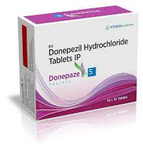donice
Introduction to Donice
Donice is a widely recognized medication primarily used to manage symptoms associated with Alzheimer's disease. As a part of the cholinesterase inhibitor class, Donice works by enhancing the function of nerve cells in the brain. By preventing the breakdown of acetylcholine, a crucial neurotransmitter, Donice helps in improving cognition and memory. This medication is available in various forms, including tablets, capsules, syrup, and injections, offering flexibility in administration based on patient needs and preferences. Whether you're a caregiver or a patient, understanding Donice's applications and effects can aid in its effective use.
Composition of Donice
The active ingredient in Donice is Donepezil, present in a 5mg concentration. Donepezil functions by inhibiting the enzyme acetylcholinesterase, which breaks down acetylcholine in the brain. This inhibition leads to an increased concentration of acetylcholine, enhancing communication between nerve cells. This boost in neurotransmitter levels can help alleviate some symptoms of Alzheimer's disease, such as memory loss and confusion.
Uses for Donice
- Treatment of mild to moderate Alzheimer's disease.
- Improvement in cognitive function and memory.
- Enhancement of nerve cell communication in the brain.
- Potential benefit in managing symptoms of dementia.
Side Effects of Donice
- Nausea and vomiting
- Diarrhea
- Insomnia
- Muscle cramps
- Fatigue
- Loss of appetite
- Dizziness
Precautions of Donice
Before starting Donice, it is crucial to inform your healthcare provider about any existing medical conditions, especially heart problems, asthma, or lung disease. It is also important to disclose any other medications you are taking, as Donice can interact with certain drugs. Pregnant or breastfeeding women should use this medication only if clearly needed and after consulting a healthcare provider. Regular monitoring by a healthcare professional is recommended to assess the medication's effectiveness and adjust dosages if necessary.
Specifications of Donice
Donice is available in multiple forms to accommodate different patient needs:
- Tablets: Typically available in 5mg doses, these are the most common form of administration.
- Capsules: An alternative to tablets, offering similar dosage and effectiveness.
- Syrup: Provides an option for those who have difficulty swallowing pills.
- Injections: Used in specific clinical settings where rapid administration is necessary.
Conclusion
Donice, with its active ingredient Donepezil, plays a significant role in managing Alzheimer's disease symptoms. Available in tablets, capsules, syrup, and injection forms, it offers versatile options for treatment. While it provides cognitive benefits, users should be aware of potential side effects and necessary precautions. Always consult with a healthcare provider to ensure Donice is the right choice for your needs and to monitor its effectiveness throughout the treatment.
Similar Medicines
Disclaimer : This information is not a substitute for medical advice. Consult your healthcare provider before making any changes to your treatment . Do not ignore or delay professional medical advice based on anything you have seen or read on Medwiki.
donice
Prescription Required
Manufacturer :
Sunrise Remedies Pvt LtdComposition :
donepezil










.svg)
